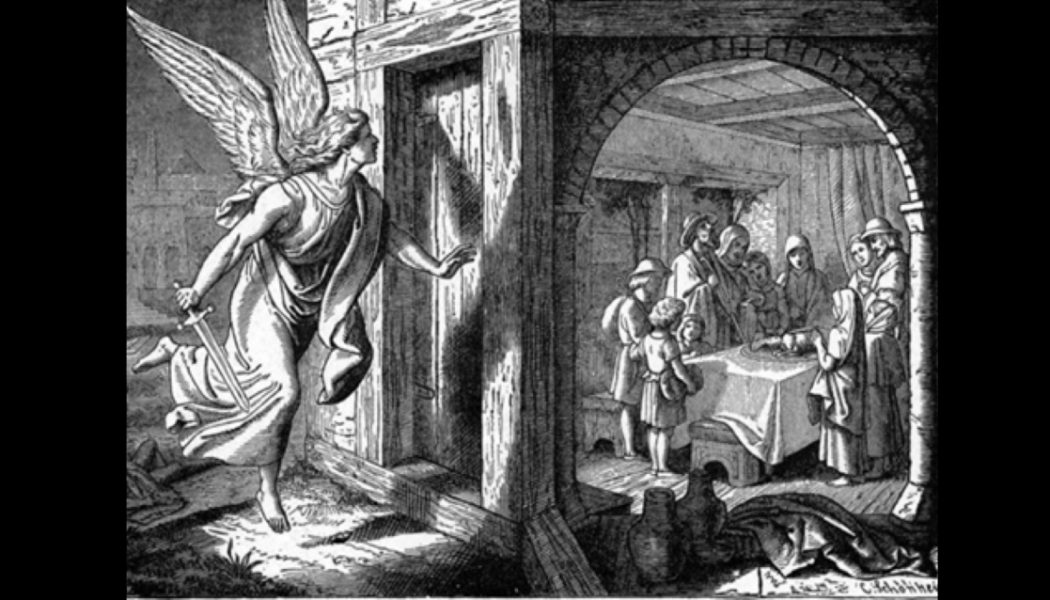
In Ezekiel’s visions, God tells of the current and coming destruction of Jerusalem. “The guilt of the house of Israel and Judah is exceedingly great. The land is full of blood, and the city full of injustice” (9:9). They, or the majority, have not only forsaken the Lord for idols and spurned God’s commands, but they have turned God’s calls to repentance and return as evidence that God has forsaken them. Ezekiel is given a symbolic vision of six executioners bringing the consequence of the idolatry the people have chosen.
Of course, there is always a remnant preserved for God (compare 1 Kings 19:18; Isaiah 1:9), faithful and seeking the Lord despite the degeneration of the people and its corrupted kings. And amid the executioners, a man in priestly garb is sent out with a “writing case.”
“Now the glory of the God of Israel had gone up from the cherub on which it rested to the threshold of the house. and he called to the man clothed in linen, who had the writing case at his waste. And the Lordsaid to him, ‘Pass through the city, through Jerusalem, and put a mark on the foreheads of the men who sigh and groan over all the abominations that are committed in it.’ And to the others he said in my hearing, ‘Pass through the city after him, and strike.”
Ezekiel 9:3-5a, ESV
I want briefly to reflect on how the faithful are characterized here. They are those who “sigh and groan” for the degradation of the city. Surely these people did other things. Surely they made sin offerings, defended the poor or foreigner, or pursued righteousness in any of the other ways that Scripture says are characteristics of God’s faithful. But none of those is how they are identified in this moment. When destruction is upon the city for all its dissolution and discord, it is sufficient to identify the faithful by the fact that it all makes them cry.
Many of us are geared to respond to systemic sin and its consequences first with indignation or savvy pragmatism. There is a place for these. God’s people must seek peace and justice for the city in which they sojourn (cf. Jeremiah 29:7; 1 Peter 1:14-19), though we should remember that “human wrath does not produce God’s justice” (James 1:20). But alongside these, a mark of hearts that thirst for justice and seek the hallowing of God’s name actually appears in our tear glands. This goes for ills that can (and should!) be fixed as much as for things that will remain until the final battle is won. It goes for sighing over how bad things are even when we are certain a calamity is deserved, for we read of the righteous grieving the fact that God’s “law is not observed” (Psalm 119:136) and grieving for those people exiled because of their sins (Jeremiah 8:23).
There are practical goods to grieving national crises and tumult—at the least it can slow us down so that we do not respond rashly, and it also disposes us not to dismiss the problems with apathy. But, more deeply, grieving over sin—and all that sin causes—is part of the transformation that grace means to accomplish while we endure in this age amid the powers of sin and death. It is an aspect of what St. Paul calls the “renewing of our minds” in Christ (Romans 12:2).
“Now this I say and testify in the Lord, that you must no longer walk as the Gentiles do, in the futility of their minds. They are darkened in their understanding, alienated from the life of God because of the ignorance that is in them, due to their hardness of heart … But that is not the way you learned Christ!—assuming that you have heard about him and were taught in him, as the truth is in Jesus, to put off your old self, which belongs to your former manner of life and is corrupt through deceitful desires, and to be renewed in the spirit of your minds, and to put on the new self, created after the likeness of God in true righteousness and holiness.”
Ephesians 4:17-24, ESV
Corrupted by concupiscence and the wounds of sin, we are inclined to see the truth through dirtied lenses. If we recognize sin by the light of natural revelation, we do not often see it clearly (or think we see it more clearly in others than ourselves; see Matthew 7:3-5). But the Spirit’s graces work to conform us to Christ in our behavior and in our perception. And as we know better who our God is, his intent for creation, and what he wants for his children, the more do we perceive the tragedy of the world’s brokenness. If Christ wept at Lazarus’s death (John 11:35) and lamented obstinacy in Jerusalem (Luke 13:34), how should we not weep when we are reminded of how broken God’s world remains?
Grief need not be nourished willfully; wallowing is of little help (cf. Sirach 30:23). And we should grieve with the humility to know that we do not yet see all things as we ought (see 1 Corinthians 13:9-13). Yet sorrow for godly reasons can produce repentance in us (2 Corinthians 7:10). And repentance, more than posturing or aggression, is what is needed in times of calamity.
Moreover, if grief in Christ comes from knowing things are not as God has promised, then it is always grief under the banner of hope (cf. 1 Thessalonians 4:13). For the same Lord who works to renew us is at work also to bring about the new heavens and earth “in which righteousness dwells” (2 Peter 3:13). He has conquered, and he will wipe away every tear (Revelation 21:4).
May godly grief, true repentance, and hope mark us as God’s people.
“Blessed are those who mourn, for they shall be comforted. Blessed are the meek, for they shall inherit the earth. Blessed are those who hunger and thirst for righteousness, for they shall be satisfied. Blessed are the merciful, for they shall receive mercy.”
Matthew 5:4-7, ESV









